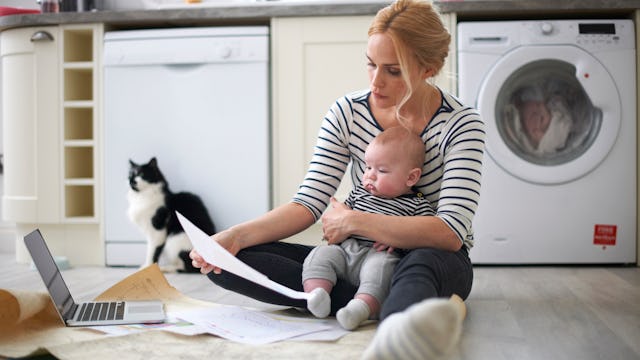Doing All The Housework Is Bad For A Mom's Mental Health

Men are doing more household chores, but women are still managing everything, to the detriment of their mental wellbeing
Russell Brand is currently in hot water with a lot of parents due to his recent comments that his wife Laura takes care of all of the managerial aspects of parenthood. But a new study has found that Laura is far from alone – and that mothers who are solely in charge of the household may pay with their mental health and happiness.
The study, published this week in the journal Sex Roles, found that although most women work outside the home, and most men now at least pitch in on chores, most women still handle the bulk of a home’s “invisible labor” – tasks like making sure the kids get new sneakers, or lining up a babysitter for an evening out. It also found that women who were burdened with these tasks reported feeling overwhelmed and empty.
The study surveyed almost 400 women who had minor children and a committed partner. And what they found might sound pretty dang familiar to moms who are in the same boat.
Even though 65 percent of the women worked outside the home, 9 out of 10 moms said they were solely responsible for the family’s schedule, while 7 out of 10 felt responsible for assigning tasks and upholding household standards. 8 out of 10 were in charge of knowing what was going on at school (like the names of administrators) while nearly 7 out of 10 said they were in charge of their kids’ emotional needs. 5 in 10 also took on the majority of the financial decisions, like investments and vacation planning.
It’s little surprise that all of this responsibility leads to feelings of stress and lack of joy about life – issues that can lead to mental health problems like depression and anxiety. Even less surprising is that doing more invisible labor around the house was linked to less relationship satisfaction.
“There’s no question that constant juggling and multi-tasking at home negatively affects mental health,” said Professor Suniya Luthar, another of the study’s authors.
“Even though women may be physically doing fewer loads of laundry, they continue to hold the responsibility for making sure the detergent does not run out, all the dirty clothes make it into the wash and that there are always clean towels available,” said one of the report authors, Lucia Ciciolla, assistant professor of psychology at Oklahoma State University. “Women are beginning to recognize they still hold the mental burden of the household even if others share in the physical work, and that this mental burden can take a toll.”
The study’s authors also pointed out that when moms suffer, kids suffer, too. When a child’s primary caregiver is stressed or mentally ill, that stress trickles down to kids with bad results – not that we should only fix the issue for the sake of the youth.
“We need to attend to the well-being of moms if we want children to do well, and also for their own sakes,” said Luthar.
What can we do to fix the issue?
Besides simply recognizing that invisible labor exists, and that women do the brunt of it, we can try to shift the load more equally between parents, while making certain that moms get the mental health support that they need. Basically: moms care for everyone around them, but they need to be cared for, too, and have the time and energy to engage in self-care.
“When mothers feel supported, they can have the emotional resources to cope well with the demands they face,” Ciciolla said. “Being able to address inequalities in invisible labor can allow women and families to create households that are more functional and less burdensome, and can also spare women mental gymnastics to find the space and time to care for themselves.”
Another solution? Making sure women have support outside of the house as well: at work, with extended family, through friends, and through hobbies. Too many women may be sacrificing these relationships outside the home to focus on running their own home.
“Resilience rests, fundamentally, on relationships,” Luthar said. “As this is true for children, it is true for mothers who tend them.”
This article was originally published on